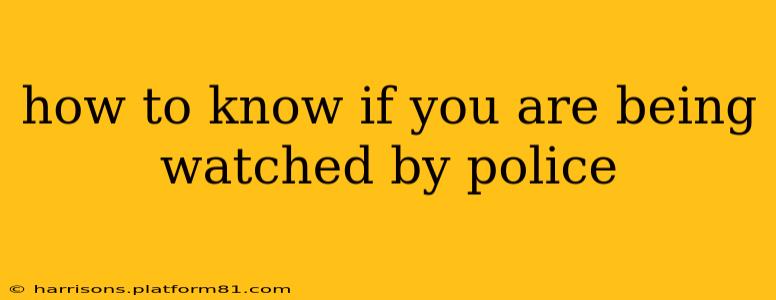Feeling like you're being followed? The thought of police surveillance can be unsettling. While there's no foolproof method to definitively know if law enforcement is watching you, understanding common surveillance techniques and recognizing potential signs can help alleviate anxiety or inform your next steps. This guide explores various scenarios and offers advice on how to proceed.
What are the common signs of police surveillance?
This is a question many people ask, and the answer depends heavily on the type of surveillance being used. Modern surveillance techniques are far more subtle than the stereotypical "black sedan following you" scenario depicted in movies. Subtle surveillance is much more common.
Obvious Surveillance Signs:
-
Visible Police Presence: This is the most obvious sign. If police vehicles or officers are consistently near your location or following you, it's highly probable that you're being watched.
-
Unmarked Vehicles: Police often use unmarked cars for surveillance. These cars might be parked nearby, following you at a distance, or even circling your area. Be aware of cars that seem to be unusually interested in your movements.
-
Individuals Following You: While not always police officers, individuals consistently following you could be surveillance operatives. They might maintain a safe distance, change their appearance (clothing or vehicle), or use other tactics to blend in.
Subtle Surveillance Signs:
-
Unexplained Phone Calls: Increased calls from unknown numbers, especially calls that quickly disconnect, might signal monitoring.
-
Unusual Electronic Activity: While more difficult to detect without specialized tools, experiencing unexpected slowdowns on your devices or noticing unusual activity on your network could indicate electronic surveillance.
-
Unexpected Encounters: Unexpected encounters with law enforcement, even seemingly trivial interactions, could indicate their presence is part of a larger operation.
-
Strange Vehicles or People Near Your Home: Unfamiliar vehicles parked near your home or individuals loitering nearby, especially during unusual hours, could be a sign of surveillance.
-
Changes in Your Routine: If you notice a change in your daily routine, such as unusual traffic patterns or unusual delays in your commute, this might be a sign of surveillance, especially if the pattern persists.
How can I tell if my phone or computer is being monitored?
Technological surveillance is increasingly common. While definitively detecting this requires specialized knowledge and tools, some warning signs include:
-
Unexplained data usage: An unexpectedly high data consumption could suggest that your device is sending information to an unauthorized third party.
-
Unusual software behavior: Unexpected pop-ups, slowdowns, or crashes could indicate malware or other unauthorized software monitoring your activity.
-
Compromised passwords or accounts: If you have experienced an unauthorized access to any of your accounts, then you should consider the possibility of technological surveillance.
What should I do if I suspect I'm being watched?
If you suspect police surveillance, proceed cautiously and avoid drawing attention to yourself. Document any observations, including dates, times, vehicle descriptions, and any unusual behavior. While you have the right to your privacy, confronting the police directly could escalate the situation. It is advised to consult with a legal professional who can advise on your legal rights and potential actions.
Can police watch me without a warrant?
In many jurisdictions, police surveillance is subject to legal restrictions. For instance, warrants are usually required for certain types of surveillance, such as wiretapping. However, different jurisdictions have varying laws concerning surveillance, making it difficult to provide a universally applicable answer. The legality of surveillance depends greatly on the specific circumstances and the laws in your jurisdiction. Consulting a legal professional in your area is recommended for a definitive answer.
Is it illegal for the police to watch me?
No, it is not always illegal for the police to watch you. In many cases, police officers are allowed to observe people in public spaces without a warrant. However, there are limitations and the legality depends heavily on the context. Actions such as installing a tracking device without a warrant or illegally accessing private communications would be considered illegal. Again, consulting legal counsel is highly recommended for specific circumstances.
Remember, this information is for educational purposes only and should not be considered legal advice. Always consult with a legal professional if you have concerns about your privacy or suspect illegal surveillance.
